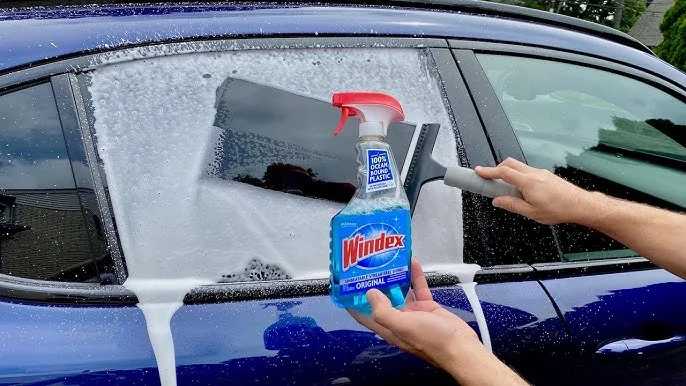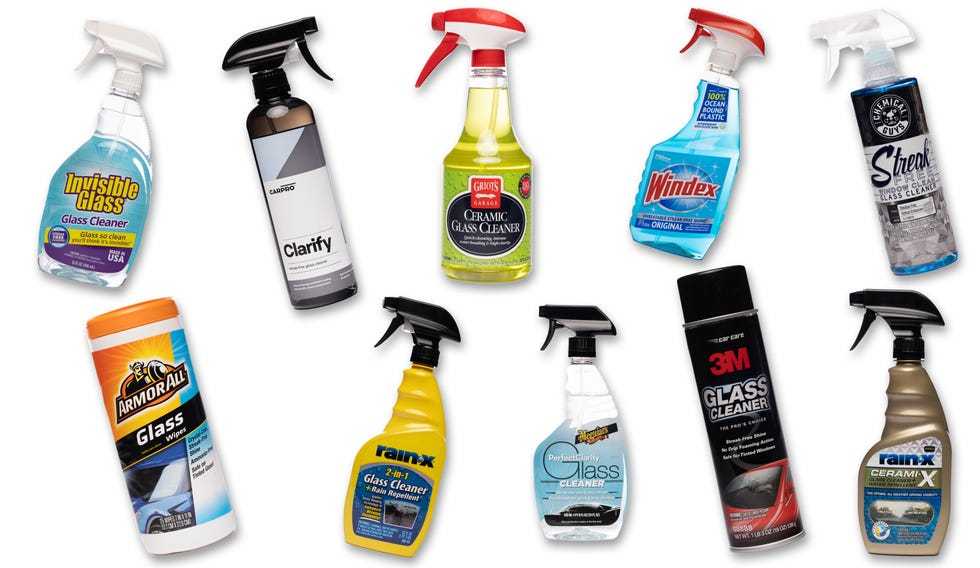Yes, you can generally use glass cleaner on your car windows, but it’s important to choose the right product and apply it correctly to avoid streaks or damage. Glass cleaners specially formulated for automotive use are best for ensuring clarity and protecting your tint or coatings.
Using a regular glass cleaner on your car windows is usually fine if it’s designed for automotive glass. However, some household cleaners contain ammonia or other chemicals that may harm tinted windows or leave residues, so selecting a dedicated car glass cleaner is the safest choice. Proper application not only keeps your windows spotless but also extends their lifespan and maintains visibility for safe driving.
Keeping your car windows clean enhances safety and aesthetics, but many car owners wonder if they can substitute regular household glass cleaners for those specifically made for vehicles. The answer is mostly yes, but with caution. Different cleaners have varying formulations, and what works for your home mirror might not be ideal for your car’s delicate coatings or tinted glass. Using the right product ensures your windows stay crystal clear without damage. To get the best results, always opt for automotive glass cleaners and follow proper cleaning methods. In this article, we’ll explore whether you should reach for that household spray or stick to specialized products to keep your car windows spotless and streak-free.
Can I Use Glass Cleaner on My Car Windows?
Understanding Glass Cleaners and Their Purpose
Glass cleaners are specially formulated liquids designed to remove dirt, fingerprints, smudges, and streaks from glass surfaces. These products are common in households for cleaning windows, mirrors, and glass tables. When it comes to cars, many drivers wonder if these cleaners are safe and effective on vehicle windows.
Are Traditional Glass Cleaners Safe for Car Windows?
Most traditional glass cleaners contain chemicals like ammonia, alcohol, or other solvents. These substances work well on household glass but may not be suitable for car windows. Ammonia-based cleaners can damage tinting or window coatings over time. It is crucial to check the label and ensure the product is compatible with automotive glass.
How Do Automotive Windows Differ from Household Glass?
Car windows often have special coatings for UV protection, tinting, or anti-reflective features. Household glass typically lacks these coatings. Using improper cleaners can strip away these coatings, reducing the effectiveness and lifespan of your windows. Therefore, choosing cleaners made specifically for automotive glass can prevent damage.
Potential Risks of Using Glass Cleaner on Car Windows
- Damage to Window Tinting: Ammonia can cause window tint to peel or turn purple.
- Reduced Visibility: Residue or streaks from improper cleaning can impair your vision, especially at night or in bad weather.
- Corrosion: Certain chemicals may corrode or degrade the window seals or frames.
- Damage to Special Coatings: Anti-glare or UV protective coatings might be compromised by harsh cleaners.
What Types of Glass Cleaners Are Safe for Cars?
Automotive glass cleaners are formulated to be safe for car windows, including tinted and coated surfaces. Look for products labeled as safe for automotive use and free from ammonia or alcohol. These cleaners are designed to clean effectively without harming coatings or seals.
DIY Alternatives to Commercial Glass Cleaners
You can make a safe and effective glass cleaner at home using simple ingredients:
- Mix equal parts of distilled water and white vinegar.
- Add a few drops of liquid dish soap for extra grease removal.
- Use a soft microfiber cloth to apply and wipe the cleaner in circular motions.
This solution is gentle on car windows and can remove dirt, grime, and fingerprints without risking damage.
Proper Techniques for Cleaning Car Windows
Using the right cleaning techniques ensures streak-free and safe results:
- Start by removing loose dirt and dust with a soft brush or cloth.
- Spray the cleaner onto a clean microfiber cloth rather than directly on the glass to prevent overspray on sensitive areas.
- Wipe in straight lines or circular motions, applying gentle pressure.
- Dry the glass with a dry microfiber cloth to prevent streaks.
- Pay special attention to edges and corners where dirt can accumulate.
Tips for Maintaining Clean Car Windows
To keep your car windows clear and streak-free:
- Clean your windows regularly to prevent dirt buildup.
- Use high-quality microfiber cloths for wiping.
- Avoid cleaning in direct sunlight to prevent rapid evaporation and streaks.
- Check your window tints periodically for signs of damage or peeling.
- Apply a protective wax or sealant to the glass for added shine and easier cleaning.
Additional Considerations When Using Glass Cleaner on Cars
Be attentive to the type of glass cleaner you select. Always read the product label for directions and warnings. Test a small area first to ensure that the cleaner does not cause any adverse effects. Also, avoid using abrasive tools like scouring pads, as they can scratch delicate glass surfaces.
Related Topics
Best Car Wash Soaps for Windows and Body
Using a dedicated car wash soap can enhance your cleaning routine, providing a gentle but effective cleaning action that helps preserve coatings and tint.
Choosing the Right Microfiber Cloth
A high-quality microfiber cloth minimizes lint and scratches, making it easier to achieve a clear, streak-free finish. Use different cloths for interior and exterior cleaning to prevent cross-contamination.
When to Seek Professional Cleaning Services
If your windows have stubborn stains, scratches, or damage to tinting or coatings, consider a professional detailer. Professionals have specialized cleaning tools and products that can restore clarity and protect your car windows.
Summary
Using glass cleaner on car windows is generally safe if you choose the right product. Automotive-specific glass cleaners are formulated to protect coatings, tints, and seals. Avoid household glass cleaners containing ammonia or harsh chemicals, as they can cause damage over time. Proper cleaning techniques and routine maintenance help keep your car windows clear, safe, and visually appealing for longer.
The Easiest Way To Clean The Inside of Your Windshield (No Streaks!)
Frequently Asked Questions
Is it safe to use glass cleaner on tinted car windows?
Using a standard glass cleaner on tinted windows can sometimes cause damage or reduce the effectiveness of the tint. Look for a cleaner specifically formulated for tinted glass or one that is ammonia-free. Always test a small area first and avoid letting the cleaner sit on the tint for too long to prevent any potential discoloration or peeling.
Can I use a regular household glass cleaner on my car’s windows?
Yes, you can use a household glass cleaner on your car windows, but choose a product that does not contain ammonia. Ammonia-based cleaners can harm the rubber and plastic components around the window and may cause a haze or damage to the tint. Opt for a cleaner designed for automotive use or one labeled safe for vehicle glass.
What should I consider before applying glass cleaner to my car windows?
Before applying, check the label to ensure the cleaner is suitable for automotive glass. Avoid cleaners with harsh chemicals that can damage the glass or leave residues. Use a soft microfiber cloth to prevent scratching and always clean in a shaded area to prevent streaks caused by rapid evaporation. Regular cleaning helps maintain clarity and prevents buildup.
Are there specific ingredients I should avoid in glass cleaners for my car windows?
Avoid cleaners containing ammonia, bleach, or abrasive compounds, as these can damage your car’s tint, seals, and glass surface. Instead, select products with gentle, automotive-specific formulas. These ingredients clean effectively without risking harm to the vehicle’s internal components or window treatments.
How often should I clean my car windows with glass cleaner?
For optimal visibility and safety, clean your car windows regularly, ideally once every two weeks or whenever they become dirty or streaky. Frequent cleaning prevents dirt buildup, reduces streaks, and keeps your windows clear, especially after bad weather or long drives.
Final Thoughts
Using glass cleaner on your car windows is generally safe if you choose the right product. Many glass cleaners are designed specifically for automotive use, ensuring they won’t damage your windows or leave streaks. Always check the label to confirm it’s suitable for car glass.
Avoid cleaners with harsh chemicals like ammonia, especially on tinted windows, as they can cause damage. Regular cleaning with a gentle cleaner keeps your windows clear and improves visibility while driving.
Can I use glass cleaner on my car windows? Yes, as long as you select a product formulated for automotive glass and follow the instructions carefully. Proper maintenance ensures a clear view and enhances your driving experience.



